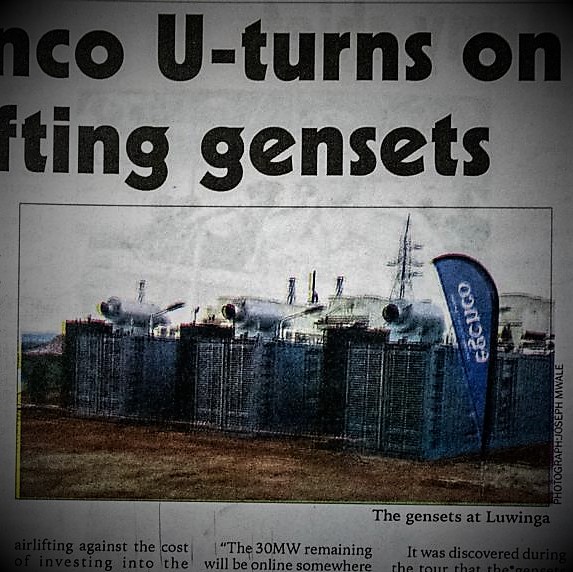
The Electricity Generation Company (Egenco) has said it will no longer airlift generators from China as communicated earlier because using that mode of transport is as good as paying half the price for purchasing the gensets.
Egenco chief executive officer William Liabunya says the company has since resorted to shipping the gensets, whose supplier is based in India.
Airlifting was meant to speed up the process of generating power from diesel-powered generators. Only three generators, with a total of six megawatts (MW) have been installed at Luwinga in Mzuzu.
Speaking in an interview at the weekend after touring the Luwinga site in Mzuzu, Liabunya said their engineers were in China to inspect the 30 MW gensets.
He said: “When we evaluated the cost of airlifting against the cost of investing into the generator itself, it was found that airlifting was costing about 50 percent of the cost of the whole generator.
“So, we found it not worth paying half the cost of the life investment of the machine just to speed up transportation by two weeks. We are using the shipment as a more economic means.”
Liabunya said the gensets are expected to start off from China mid-January, and will be in Malawi by next month.
“The 30MW remaining will be online somewhere between March and April. Our engineers were in China inspecting them and have approved these gensets. They will be shipped mid-this month and we expect them by February to be here and installation and commissioning will go as planned,” he said.
In Mzuzu, two of the three gensets are running, contributing 4MW to the national grid. The last one is expected to start running this week, according to Liabunya.
It was discovered during the tour that the gensets are now using at least 560 litres of diesel per hour, but are only running four hours a day from Monday to Friday.
Liabunya said they can only extend the four hour-period to power essential services such as hospitals when there is prolonged blackout.
Earlier, former chief executive officer of the Electricity Supply Corporation of Malawi (Escom) Kandi Padambo said while it is imperative to use such for short-term relief, the move is not sustainable for the economy.
He said: “Use of diesel generators for electricity generation is very expensive, even if it is for home use only. One needs to come up with cost as to how much one can use per kilowatt per hour because even for a 10 MW generator, it will require heavy machinery which is costly and it is the electricity user who is going to pay for these.”
Egenco plans to install 36MW of diesel generators with a 6MW plant in Mzuzu, 10MW in Lilongwe and 20MW in Blantyre as well as the procuring of 50MW emergency power and the acquisition of land for solar panels.
Government is doing feasibility studies at Fufu on South Rukuru River with the potential capacity of 120MW, Mpatamanga Gorge with a capacity of 300MW, Kholombidzo Falls with a capacity of 150MW, Chimugonda with a capacity of 60MW and Kam’mwamba thermal powered plant with the potential capacity of 300MW.
